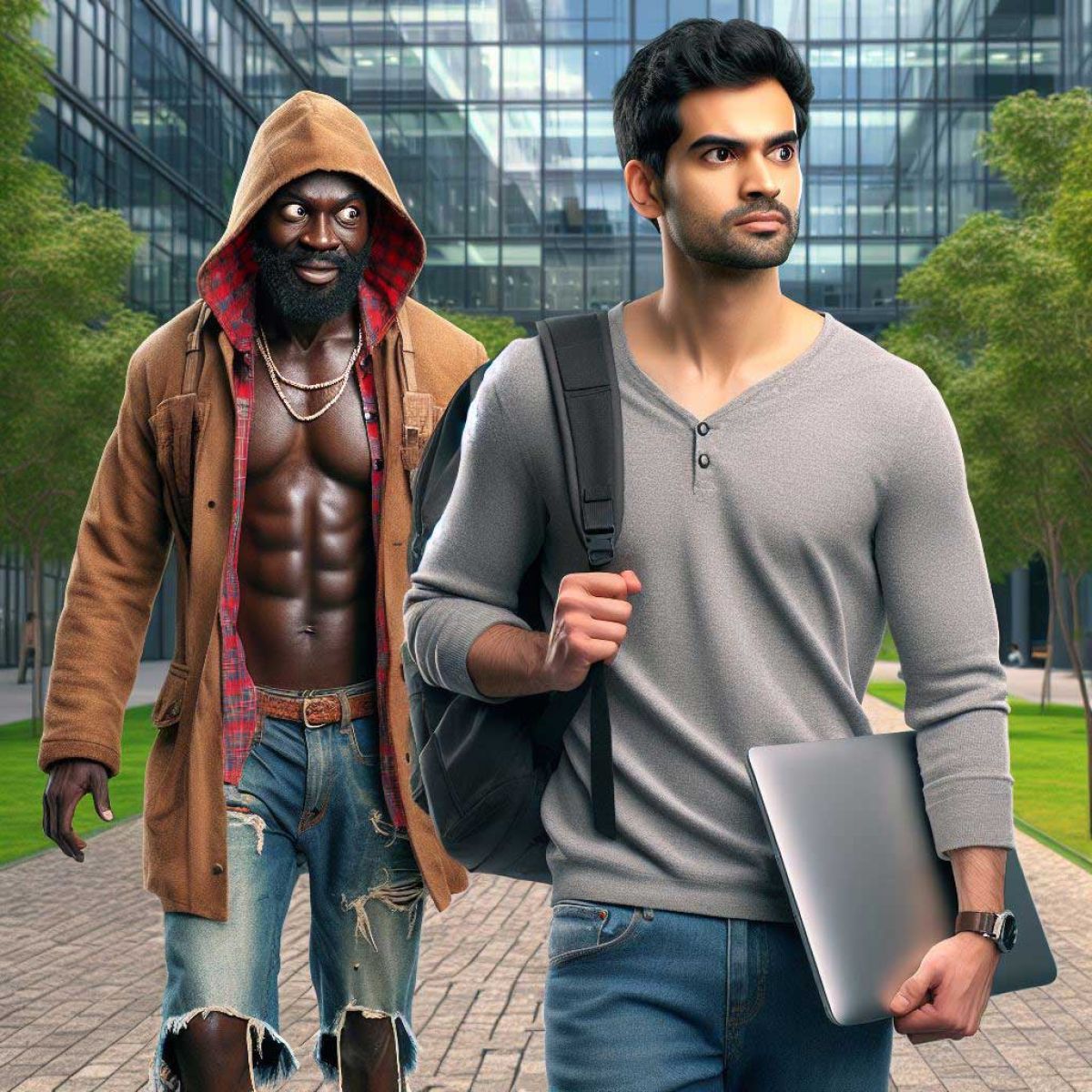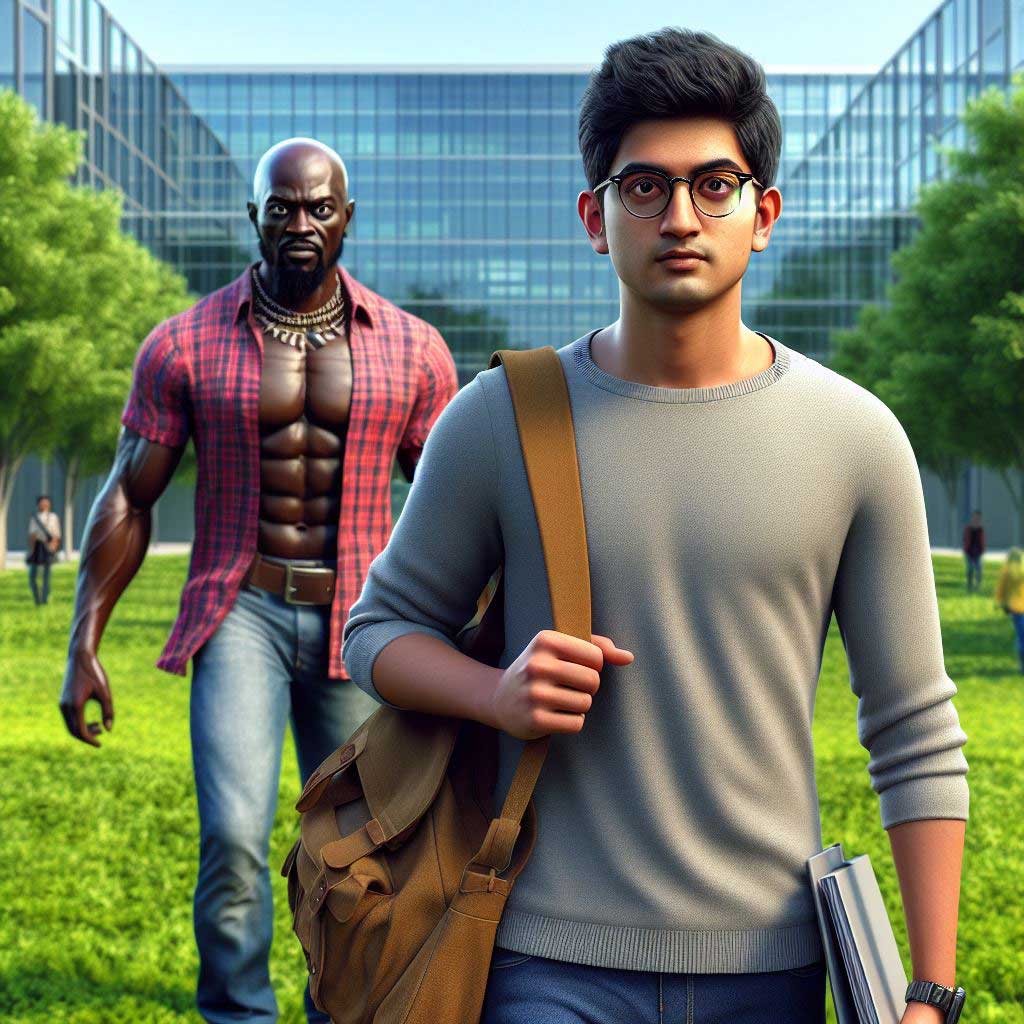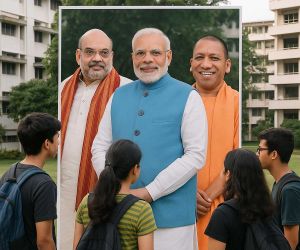MORE COVERAGE
Twitter Coverage
Satyaagrah
Written on
Satyaagrah
Written on
Satyaagrah
Written on
Satyaagrah
Written on
Satyaagrah
Written on
JOIN SATYAAGRAH SOCIAL MEDIA
Another Indian student, doctoral candidate Sameer Kamath, found dead in Indiana - the sixth in a string of tragedies, two from Purdue, hinting at a deeper, somber story alongside Neel Acharya, Varun Chheda, Akul Dhawan, Jaahnavi Kandula, and Vivek Saini

In a distressing turn of events marking the fifth such tragedy this year, 23-year-old Indian student Sameer Kamath's life was cut short in Warren County, Indiana, United States. Kamath, embarking on a journey of academic excellence, was pursuing his doctoral studies in mechanical engineering at the prestigious Purdue University.
|
"Sameer Kamath, a doctoral candidate in mechanical engineering, was found dead in Warren County, the mechanical engineering head Eckhard Groll announced to the ME community, Tuesday afternoon," reported 'The Exponent,' Purdue University's newspaper. This somber news, a significant loss to the academic community, has left many in shock and mourning.
The details surrounding Kamath's untimely demise were further elaborated in a press release from Warren County Coroner, Justin Brummett. According to the release, Kamath (23) was found at about 5 pm (local time) on Monday at NICHES land trust, a nature preserve, at Crow’s Grove. The serene setting of his discovery belies the tragedy of his passing. A forensic autopsy was scheduled to take place on Tuesday afternoon (local time) in Crawfordsville, shedding light on the circumstances leading to his death.
Kamath, originally from Massachusetts, was an alumnus of the University of Massachusetts Amherst, where he completed his bachelor's degree in mechanical engineering. With aspirations that reached beyond the horizon, he came to Purdue in the summer of 2021. According to the summer commencement program, Kamath's academic journey was marked by achievement as he graduated from the department with a Master’s Degree in mechanical engineering.
Sameer Kamath, a promising young mind whose life tragically ended in Warren County, Indiana, further details emerge about his academic journey and the ongoing investigation into his untimely death. Kamath, who was diligently working towards his doctoral degree in mechanical engineering at Purdue University, was expected to complete his studies in 2025. His ambitions and future plans, as detailed on his LinkedIn profile, reflect a bright future that was unfortunately cut short.
|
The Warren County Coroner's office is actively investigating the circumstances surrounding Kamath's death. "The Warren County Coroner said that more information will be shared when more information is available." This commitment to transparency comes amidst growing concerns over the safety and well-being of Indian students in the U.S., as Kamath's death adds to a distressing pattern observed this year.
Authorities are in the midst of a thorough investigation, with the coroner, Justin Brummett, spearheading efforts to uncover the truth. A comprehensive forensic autopsy is expected to shed light on Kamath's final moments, with results anticipated soon. Brummett has also assured the public of forthcoming updates, promising to disseminate the information as soon as it becomes available.
This incident is part of a larger, alarming trend of Indian students meeting untimely deaths in the U.S. this year, marking the fifth such occurrence. Among these, the case of Shreyas Reddy, a student at the Linder School of Business, stands out. Reddy was found deceased in Cincinnati, Ohio, just last week, with the cause of his death still shrouded in mystery.
The recurring incidents underscore the broader challenges and risks faced by Indian students pursuing their studies in the United States. Each case, including Kamath’s and Reddy’s, not only represents a personal tragedy for their families and friends but also raises significant questions about the safety and support systems in place for international students.
"This was the third death of an Indian student within a span of a week. Prior to him, Vivek Saini and Neel Acharya were also found dead in the same week." The loss of these young lives has left a void in the hearts of their families, friends, and the wider Indian community abroad.
|
Adding to the sorrow, "Notably, Neel Acharya was also a student at Purdue University. His body was found at the campus on January 30." This tragic event marked yet another Purdue University student's life lost in disturbing circumstances. The community was further shaken by the brutal killing of another Indian student, Vivek Saini, "brutally killed with repeated blows from a hammer by a homeless man inside a store in Lithonia, Georgia, US on January 29."
The sequence of these deaths does not end there. Earlier, on January 20, "Akul Dhawan, an 18-year-old Indian-American student, was found dead near the University of Illinois." These incidents, occurring close together, have heightened concerns about the safety of Indian students in the U.S.
The case of Sameer Kamath is particularly poignant, coming over a week after Neel Acharya's body was discovered on the Purdue University campus. While Kamath's death occurred off-campus, it is seen as potentially the third Purdue-centric tragedy in less than two years, following the earlier reported death of Varun Manish Chheda in October 2022, "killed in his room by a fellow Korean student, Ji Min 'Jimmy' Sha."
Furthermore, the names G Dinesh, Nikesh, Syed Mazahir Ali, Vivek Saini, Shreyas Reddy Beniger, and Akul Dhawan represent a grim list of Indian students whose lives were cut short under mysterious and often violent circumstances in the U.S. recently.
These consecutive tragedies resemble "dominoes falling and taking down everything in their path," prompting urgent reflections on the security and safety of Indian students abroad. The series of deaths raises critical questions about the effectiveness of current security measures and the broader implications for the international student community. It compels us to consider not only the lives lost and reported but also the unsettling possibility that there might be others who have suffered a similar fate, yet remain unnoticed by the public eye. This situation demands a reevaluation of the support and protection extended to students navigating their academic and personal lives far from home, in the hope of preventing further losses in a community already too familiar with grief.
US University Shaken by 2 Deaths in Less Than 2 Years, Students Say It's ‘Deeply Unsettling’
Purdue University, a renowned institution nestled in West Lafayette, Indiana, finds itself grappling with the weight of grief and unease following two student deaths within a span of less than two years. The recent passing of Neel Acharya has reignited concerns regarding student safety and the perceived adequacy of campus security measures.
The atmosphere on campus is one of palpable distress, with students expressing that the situation is "deeply unsettling." The sense of security that one expects within the confines of an educational institution has been notably shaken, leaving many to question the effectiveness of the university's approach to safeguarding its students.
Neel Acharya, whose absence was keenly felt in the days leading up to the tragic discovery, was found deceased on the Purdue campus. In an effort to unravel the circumstances of Acharya's death, an autopsy was conducted on January 29. Coroner Carrie Costello's findings revealed a lack of physical trauma, stating that "there were no signs of trauma on his body." As the investigation continues, the exact cause and manner of Acharya's death remain a matter of ongoing inquiry, leaving a community in search of answers.
The tragedy of Acharya's death follows the loss of another young talent from the Purdue community. In 2022, Varun Manish Chheda, a 20-year-old student of Indian origin, fell victim to a heinous act of violence. Chheda, who was pursuing data science, met a brutal end, succumbing to "multiple sharp force traumatic injuries." The perpetrator, identified as Ji Min ‘Jimmy’ Sha, a 22-year-old junior cybersecurity major and international student from Korea, was arrested on charges of murder. This horrific incident not only robbed a family of their loved one but also left an indelible mark on the student body, contributing to the current climate of fear and uncertainty.
|
‘Such Tragedies on Our Own Campus Are Deeply Unsettling’
In the wake of two recent tragedies, the Purdue University student community has been compelled to confront unsettling questions about safety and security on their campus. The loss of two of their own within a relatively short span has stirred a mix of disbelief, concern, and a pressing need for introspection among the students, particularly those from the Indian student community.
"The news of the two deaths sent a wave of disbelief and concern among the Indian student community. Learning about such tragedies on our own campus is deeply unsettling," shared a Purdue student during an interview with Hindustan Times, preferring to remain anonymous. This sentiment reflects the broader unease permeating through the campus, as students grapple with the reality of such losses hitting so close to home.
In light of Neel Acharya's death, this sense of unease has only intensified. "Acharya’s death has definitely heightened my sense of concern about safety on campus. It makes me question the overall security measures and prompts us to consider what more can be done to ensure the well-being of students," the student elaborated. The incident has acted as a catalyst for a deeper examination of the university's approach to campus safety, urging a reassessment of the existing security protocols.
However, the student was keen to point out that these incidents should not lead to hasty generalizations about the safety of Indian students in the US. "The perception could be influenced by sampling bias, where the focus is on specific incidents involving Indian students, potentially overshadowing cases involving students from other backgrounds. It's crucial to consider a broader perspective and comprehensive data to accurately assess the safety concerns of all students, regardless of their nationality," the interviewee noted. This perspective calls for a balanced view that acknowledges the diversity of experiences and challenges faced by students from various backgrounds.
|
Moreover, the student highlighted a critical area for improvement: "There is also a need for universities to continually evaluate and enhance safety measures for all students, fostering an environment where everyone feels secure and supported." This remark underscores the ongoing necessity for universities to not only address immediate concerns but also to proactively foster a culture of safety and support that reassures every student of their well-being while on campus.
Amidst the discourse, Koustuv Saha, from the Department of Agricultural Economics, shares a more positive outlook on his time at Purdue, while also acknowledging the concerns that have emerged from his close circle.
"My own experience at Purdue has been good, although I have heard from friends and family who have had bad experiences. These usually do not occur on campuses though." Saha's perspective offers a reminder that while the campus has been the site of recent sorrow, it remains a place of safety and learning for many. He further elaborates, "I haven’t encountered anything on campus that has made me think that Indian students as a community are at risk maybe. I spend most of my time on campus and it feels very safe. I think these were isolated events," suggesting a belief in the fundamental security of the campus environment, despite the isolated nature of these incidents.
Contrasting Saha's experience, another student who chose to remain anonymous expressed a distinct unease, particularly with the university administration's response to the incidents. "I don’t think they showed a lot of concern about the recent tragedy," he remarked, highlighting a perceived lack of empathy or action following the losses. This sentiment extends to a broader concern for personal safety, influenced by the cultural and societal context of the U.S., "It’s obvious for students in the US to feel unsafe," the student added, pointing to the prevalence of firearms as a significant factor, "The cost of freedom is not free. There are guns everywhere."
|
|
This student also touched on the impact of interpersonal relationships on their sense of security, using their living situation as an example. "That may have been an isolated incident but personally, even I feel uncomfortable because my roommate is noisy and messy. I have to be strategic to have a polite conversation with him without triggering him."
Saunok Chakrabarty, affiliated with the Economics department, offers pragmatic advice amidst these concerns. "I don’t feel an increased concern about my safety in Purdue. But I would generally advise people to avoid traveling alone during the late hours of the night." This perspective emphasizes the importance of caution and vigilance, particularly during times when vulnerability may be heightened.
Echoing Chakrabarty's sentiments, the first student who preferred anonymity shared their personal safety strategies. "Being aware of my surroundings, avoiding isolated areas during odd hours, and staying connected with friends are some of the measures I take." These comments reflect a proactive approach to personal safety, underscoring the significance of situational awareness and the strength of community as deterrents against potential threats.
Amidst these voices, the university's administration has not remained silent. Tim Doty, Senior Director of Media and Public Relations at Purdue, conveyed the institution's response to the loss within their community. "Our university president held a moment of silence for Neel Acharya last Friday during a Board of Trustees meeting. Please note that the family is asking for privacy in this time." This gesture of remembrance and respect illustrates the university's acknowledgment of the grief and loss experienced by the community and the importance of solidarity in such times.
The tragedies of Neel Acharya and Varun Manish Chheda, along with other Indian students like Akul Dhawan, Jaahnavi Kandula, and Vivek Saini, who have met untimely deaths in the US, cast a long shadow over the Indian student diaspora abroad. These incidents serve as a stark reminder of the vulnerabilities faced by international students, prompting discussions on how best to navigate and mitigate these risks.
 |
 Support Us
Support Us
Satyagraha was born from the heart of our land, with an undying aim to unveil the true essence of Bharat. It seeks to illuminate the hidden tales of our valiant freedom fighters and the rich chronicles that haven't yet sung their complete melody in the mainstream.
While platforms like NDTV and 'The Wire' effortlessly garner funds under the banner of safeguarding democracy, we at Satyagraha walk a different path. Our strength and resonance come from you. In this journey to weave a stronger Bharat, every little contribution amplifies our voice. Let's come together, contribute as you can, and champion the true spirit of our nation.
 |  |  |
| ICICI Bank of Satyaagrah | Razorpay Bank of Satyaagrah | PayPal Bank of Satyaagrah - For International Payments |
If all above doesn't work, then try the LINK below:
Please share the article on other platforms
DISCLAIMER: The author is solely responsible for the views expressed in this article. The author carries the responsibility for citing and/or licensing of images utilized within the text. The website also frequently uses non-commercial images for representational purposes only in line with the article. We are not responsible for the authenticity of such images. If some images have a copyright issue, we request the person/entity to contact us at This email address is being protected from spambots. You need JavaScript enabled to view it. and we will take the necessary actions to resolve the issue.
Related Articles
- "Harvard latest course: How to lose billionaires 101": As the Harvard university's stance on a pro-Hamas letter sparks debate, luminaries like Idan Ofer and Wexner Foundation cut all the ties, Harvard's once-untouchable prestige now faces serious scrutiny
- 'Resign In Disgrace and Retire with Remorse': Presidents of Harvard, UPenn, and MIT face public condemnation, accused of shamefully overlooking 'calls for genocide of Jews' on campuses. A storm of controversy brews, demanding accountability and change
- USA gun violence claims the life of Indian doctoral student Aaditya Adlakha in Cincinnati, mirroring the tragic fates of Jude Chacko, Saiesh Veera, and Devsish Nandepu - all lost on foreign soil, far from their motherland's embrace, their dreams shattered
- "Irony became the head that bit its tail and then there is no way out": Stanford University released a list of ‘harmful words’ and what to replace them with, also banning the word “American” on its websites because the term may be offensive
- "देख रहे हो न विनोद": Soros and Clinton, among 19 to be awarded the Presidential Medal of Freedom by Biden; Soros’s Open Society Foundations faces scrutiny for funding anti-India activities and narratives against PM Modi’s democratically elected govt
- "Secrets and Lies": Muhammad Yunus, linked to the Clintons through $13M USAID funds, $300K donation claims, IRS threats to Sheikh Hasina's son, and loans via Clinton Foundation, faces scrutiny over his daughter Monica’s alleged role in Biden’s PCAH
- "Education is learning what you didn't even know you didn't know": The Rising Phoenix: A Comparative Study of the College Shutdowns in America, the Ascendancy of Indian Education and undergoing significant change in Landscape of higher education globally
- "Terrorism is the price of empire. If you do not wish to pay, you must give up the empire": Biden vows continued cooperation with Hamas-linked Islamic Society of North America, no concern on Left for Islamic jihad as it doesn't exist; “Islamophobia” does
- "अपना घर संभलता नहीं": US yet again failed to prevent another mass shooting, with 3 killed and 2 injured near the University of Cincinnati campus, exposing a grim reality as the nation surpasses 240 mass shootings this year, averaging more than one daily
- "India Pedals, World Applauds": India's craftsmanship rides global waves as Hero Ecotech bicycles, proudly made in India, hit Walmart shelves in the USA, marking a triumphant moment in India's manufacturing saga & reinforcing its global economic footprint
- "Never thought, Chilgoza talks": Thanks to the US hospitality, Pannun, the Khalistani maestro of threats, is back with another warning, this time, he plans to return the favor to India's alleged assassination attempt with a grand assault on the Parliament
- Against a mother's hesitant heart, Abhijit's journey ends in tragedy, marking him as the 9th Indian lost in the US this year, alongside Neel Acharya, Vivek Saini, and more; their stories, a sombre echo of dreams shattered far from home, cry out for safety
- India condemns Connecticut General Assembly for recognising declaration of Sikh Independence: 'Mischievous elements using Assembly for nefarious purposes, India and USA has no place for bigotry and hatred'
- "Americans have the right to choose to be unarmed and helpless. Be my guest": In a horrifying incident, police officer in the US city of San Antonio opened fire on an unarmed teenager eating a hamburger in a McDonald’s parking lot, injured boy recovering
- "True art awakens the Extraordinary Ovation": 15 standing ovations, 79 applauses, autographs, selfies, and the whole house echoing with ‘Modi Modi slogans, Prime Minister Modi's joint address to the US Congress resonated as a resounding success

























